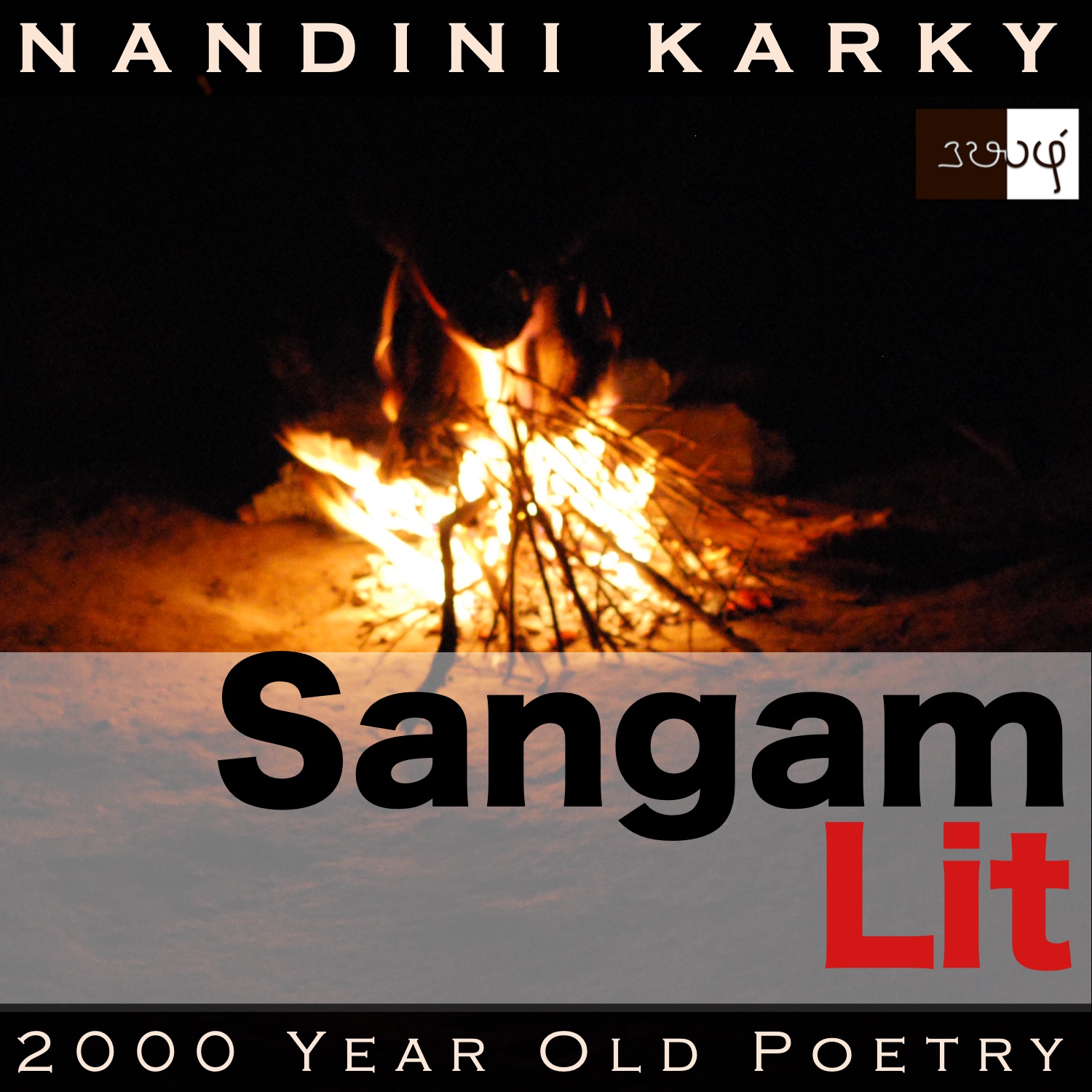Podcast: Play in new window | Download
Subscribe: Apple Podcasts | Spotify | Amazon Music | Android | iHeartRadio | TuneIn | RSS | More

In this episode, we observe the puzzled wonderment in a lady, as depicted in Sangam Literary work, Kurunthogai 150, penned by Maadaloor Kizhaar. Set in the mountains of ‘Kurinji’, the verse speaks in the voice of the lady to her confidante, when her friend approaches her about a tryst by night with the man.
சேணோன் மாட்டிய நறும் புகை ஞெகிழி
வான மீனின் வயின்வயின் இமைக்கும்
ஓங்கு மலைநாடன் சாந்து புலர் அகலம்
உள்ளின், உள் நோய் மல்கும்;
புல்லின், மாய்வது எவன்கொல்?-அன்னாய்!
‘Soaring and fading’ are the contrasting elements presented in this verse. The opening word ‘சேணோன்’, meaning ‘a person who sits on high’, happens to be a single word coinage for a guard, who takes residence in a high loft, overlooking the millet fields below. Next, we inhale the ‘fragrant fumes of a fire brand’ in ‘நறும் புகை ஞெகிழி’. Although the word ‘ஞெகிழி’ has come to mean ‘plastic’ in contemporary Tamil, in this ancient verse, it means ‘a firebrand’. That it is emitting perfumed fumes could mean that the wood used in the firebrand is sandalwood. Sounds like a case of ‘taken-for-granted’ luxuries of the past! Speaking of which, we encounter ‘சாந்து புலர் அகலம்’ further down, meaning ‘a chest smeared with sandalwood paste’. We glance at the two opposing themes in ‘மல்கும்’ meaning ‘surges’ and ‘மாய்வது’ meaning ‘vanishes’. The verse ends with the word ‘அன்னாய்’, translating as ‘O mother’ but since the listener is the confidante, we understand this is an endearing way of addressing a friend much like the contemporary Tamil usage of ‘ma’ among friends.
What could be surging and vanishing here? The context reveals that the man and lady had been leading a love relationship and the man was trysting with the lady by day. Deciding to seek a tryst by night, he seeks out the confidante’s help. Acceding to his request, the confidante talks to the lady about a nightly tryst with the man. To the confidante, the lady says, “The fire brand, emitting fragrant smoke, lit by a guard atop the millet field, twinkles like stars in the sky, here and there, in the tall mountains of the lord’s domain. If I think about his chest smeared with dried sandalwood paste, my inner affliction increases. When I embrace his chest, the affliction abates. How is that possible, O dear friend?” With these words, the lady conveys to her confidante, her acceptance of the man’s request to tryst with her by night.
Time to explore the nuances. The lady starts by calling our attention to firebrands lit in high lofts by the guards of the millet fields, and points out to the fragrant smoke arising from these burning logs. She places the light emitted by these firebrands on high to the twinkling of stars in the sky. As if mentioning these elements only to describe the man’s mountain country, the lady adds that when she thinks about the man’s sandalwood smeared chest, she feels her love affliction soars and torments her. But, the moment she embraces that chest, she feels that her affliction fades and dies away. She ends by expressing her surprise at these contrasting reactions in her to the confidante.
What seems puzzling to the lady is that it’s the same entity that’s causing opposing feelings in her. When she’s just thinking of the man, her affliction soars to the sky, but when she is embracing him, that affliction falls to the earth and dwindles. In the scene of firebrands glowing from high places, the lady visualises that it will be an easy walk for the man to arrive for his tryst by night, guiding by these twinkling lights. Indirectly, with these references, the lady is simply telling her confidante that she did a good thing in accepting the man’s request to tryst with the lady by night. In our times, we would say such things directly and to the person concerned, but it’s these indirect allusions that leave us, the successors, with these tiny treasures that do twinkle like stars in the sky of Sangam literature.




Share your thoughts...